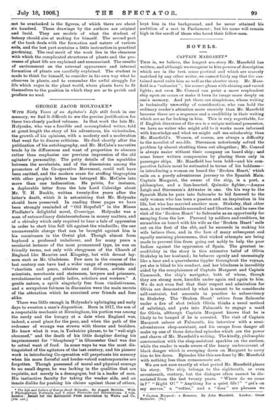GEORGE JACOB HOLYOAKE.*
WITH Sixty Years of an Agitator's life still fresh in our memory, we find it difficult to see the precise justification for these two closely packed volumes. In that work the late Mr. Holyoake, who was a forcible and accomplished writer, told at great length the story of his adventures, his vicissitudes, the growth of his opinions, with a modesty and a moderation that went far to disarm criticism. He died shortly after the publication of his autobiography, and Mr. McCabe's narrative tends by its diffuseness and want of proportion to obscure rather than emphasise our previous impression of the old agitator's personality. The petty details of the squabbles between the secularists, and of the dissensions among the promoters of the Co-operative Movement, could well have been omitted, and the modern craze for stuffing biographies with other people's letters has betrayed Mr. McCabe into more than one indiscretion. He prints, for instance, a deployable letter from the late Lord Coleridge about Mr. T. H. Buckle, written twenty-five years after the latter's death, which it is astonishing that Mr. Holyoake should have preserved. In reading these pages we have been strongly reminded of "Old Hopef " in the Misses Findlater's delightful novel, Crossriggs. Holyoake was a man of extraordinary disinterestedness in money matters, and of a chivalry which only required to hear a tale of oppression in order to start him full tilt against the windmills; the one unanswerable charge that can be brought against him is his connivance in the Orsini plot. Though almost from boyhood a professed unbeliever, and for many years a secularist lecturer of the most pronounced type, he was on friendly terms, not only with clergymen of the Church of England like Maurice and Kingsley, but with devout lay- men such as Mr. Gladstone. Few men in the course of the last century can have bad a wider range of correspondents : " chartists and peers, atheists and divines, artists and scientists, merchants and statesmen, lawyers and prisoners, revolutionaries and gentle ladies, scholars and workers." A gentle nature, a spirit singularly free from vindictiveness, and a scrupulous fairness in discussion were the main secrets of the attraction which he exercised over friends and foes alike.
There was little enough in Rolyoake's upbringing and early days to sweeten a man's disposition. Born in 1817, the son of a respectable mechanic at Birmingham, his portion was among the needy and the hungry at a date when England was, indeed, a cruel place for the poor, and when the path of the redresser of wrongs was strewn with thorns and boulders. He knew what it was, in Yorkshire phrase, to be "well-nigh olemmed," and the death of his little daughter. during his imprisonment for "blasphemy" in Gloucester Gaol was due to actual want of food. In some ways he was the most dis- tinguished of the agitators of the last centm7, and his pioneer work in introducing Co-operation will perpetuate his memory when his more forceful and !ander-voiced contemporaries are forgotten. Though possessed of Moral and physical courage to no small degree, he was lacking in the qualities that are requisite, not merely in a demagogue, but in a leader of men. His instinctive faculty for taking the weaker aide, and an innate dislike for pushing his claims against those of others, • The Life and Letters of George Jacob Ilelyeake. By Joseph McCabe. With 2 Photograiure Portraits and 8 other Portraits and Illustrations. 2 vols. London : Issued for the Rationalist Press Association by Watts and Co. [16s. net.]
kept him in the background, and he never attained his ambition of a seat in Parliament ; but his name will remain high in the scroll of those who loved their fellow-men.






































 Previous page
Previous page